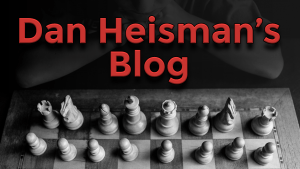Q&A with Coach Heisman Nov 9, 2012
Due to (my) technical error, the show got started late, but we got in the full 90 minutes - the show must go on  ! At the start and end of the show I made two announcements:
! At the start and end of the show I made two announcements:
- Congratulations to Chess.com for getting to 6,000,000 members! What a feat! Amazing.
- The Dan Heisman Chess Learning Center (http://www.chess.com/groups/home/dan-heisman-learning-center) here at Chess.com is helping me hold a simultaneous exhibition to raise money for the Dan Heisman Chess Support Fund at The Philadelphia Foundation (www.philafound.org). Players will make a tax-deductible contribution via https://www.philafound.org/tabid/160/Default.aspx?tp=SPEC&fn=Dan%20Heisman%20Chess%20Support%20Fund. We are trying to see if we can get 6 or more to sign up for 12 noon Sunday to play online at Chess.com Live. I have never played an online simul before but I have played dozens of over-the-board simuls. My record is to play 31 at once (my blindfold record was 2 simultaneous - that was harder!).
We started the TV show with a ton of opening questions (see What is a Good Opening? http://blog.chess.com/danheisman/whats-a-good-opening ) which I answered, throwing in my usual message "Openings are very important, but which openings you choose and the necessity for memorizing lots of lines is much less important." I guess GM Alburt agrees with me, because in his and Al Lawrence's book Chess Rules of Thumb, they chose to use my quote "Any opening that you know well is good no matter what its reputation" (p.133) and in his book Grandmaster Secrets: Openings, GM Soltis suggests some good reasons why a class player might be better off choosing openings that grandmasters don't currently find fashionable.
One excellent question involved evaluation of positions (see Evaluation Criteria at http://www.chesscafe.com/text/heisman27.pdf). I stated that IMHO there were four evaluation criteria:
1-2 (tie) Material
1-2 (tie) King Safety
3 Activity of all pieces
4 Pawn Structure
When I say this, I always get the concern "What about things like 'space'?" For that I wrote the article Activity is the Real Goal at http://www.chesscafe.com/text/heisman63.pdf. It can be summarized as follows: The entire idea of space is to give your army more activity than your opponent's. If it does that (and it usually does), then it works and its great. If it doesn't then space in itself is not what you are looking for - you want the extra activity it confers. In other words, space is a real concept, but it's more a means to an end (more activity). A lot more on this not only in that article, but my first book Elements of Positional Evaluation 4th edition (Edition 1 was written on my typewriter in 1974 when I was 24 and at the "peak" of my chess powers! Unfortunately that was 38 years ago. Agh!  )
)
As a silly example where king safety, material, and activity are all roughly equal, but pawn structure decides, I showed this monstrosity:
Not too likely this position would occur in a game  .
.
Another question asked Alekhine or Tal? If we are having dinner I have little doubt Tal would be more interesting! But which criteria to use to answer his open question? Playing strength? Tal may have had a slightly longer peak but, due to health reasons, Alekhine probably had a longer peak. Both were dynamic players but at that point the styles separate with Tal a famous "mad sacrificer" and Alekhine more a sharp combiner. Alekhine was great at using all parts of the board, e.g. tying up the opponent on the queenside and then initiating an unstoppable kingside attack. Both have famous books about their games - My Chess Career by Alekhine and The Life Games of Mikhail Tal.
Someone asked me about preparing for their first tournament. When I whipped out Enhancing Your First Tournament Experience (http://www.chesscafe.com/text/heisman42.pdf), someone on the channel quipped "Dan has an article about everything!" - Yes, that's the idea!  By the way, for those who wish to enhance the link, a quick summary is:
By the way, for those who wish to enhance the link, a quick summary is:
- Get out and play - don't lock yourself in a closet til you think you are ready
- Bring equipment - most tournaments don't provide anything but scoresheets
- It's not elimination - most tournaments are swisses where you play someone doing as well as you are. So if you lose, don't go home!
- The single most important rule to know is "You are allowed to stop your clock and get the tournament director (TD) to ask questions or make claims. Do not listen to your opponent about rules! If you do and don't get the TD, you get what you deserve." The rule book is thick but this is the only rule you need to know.
- Everyone is nervous in their first event but the only way to get over it is to keep playing
- Don't be afraid of losing, be afraid of playing and not learning anything
- Everyone is a stranger when you first meet them. After the game, time willing, ask your opponent if he will review the game with you in the Skittles room (this is very important if you want to get better).
- Getting plenty of sleep and eating well is more important than trying to cram for a tournament. If you are 1400 you won't get to 1500 in 3 days
 .
.
I get asked quite often "What is the best way to learn X?" where X is openings, endgames, planning, whatever. It's clear that books are helpful (as an author with my 11th book The World's Most Instructive Amateur Game Book coming out in three weeks, I must agree!), but they can't look at what you do and say "No, you are misunderstanding that!" or "Yes, but in general Y is much more important!" So the way I learned most everything in chess was to play in lots of tournaments and in strong clubs and go over games with opponents and humans. This was augmented by playing over about 2,000 annotated master games (see Annotated Game Collections vs. Instructive Anthologies; http://www.chesscafe.com/text/heisman121.pdf) which helped me learn openings, middlegames, endgames, planning, principles, etc. - just about everything but time management. For example, I learned more about endgames from playing and reviewing games in tournaments and reading annotated master games than I did from reading all the endgame books put together.
Finally, someone saw a bookshelf full of books behind me and asked "Are those all chess books?" and my answer was "Yes, that's about 1/5 of my collection!". I have over 1,000 books and many more magazines. When I retired I was looking to donate about half to somewhere that could display them permanently and publicly. The National Chess Center in St. Louis agreed to host, but we could not find a way to inexpensively ship the books there. The Marshall Chess Club said they would take the books and distribute them, but that's not at all what I was wanted to do with them. Luckily, I am not retiring yet so there's time...






